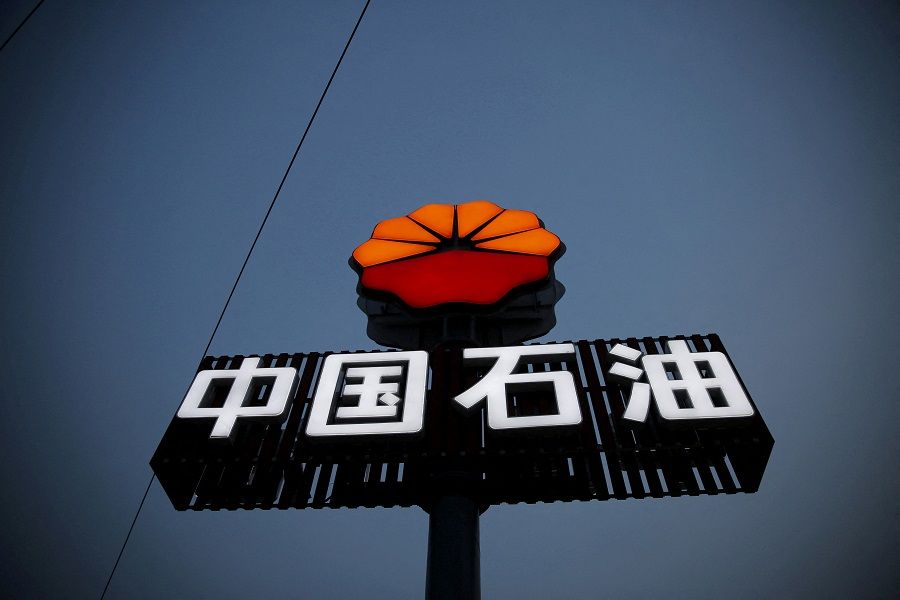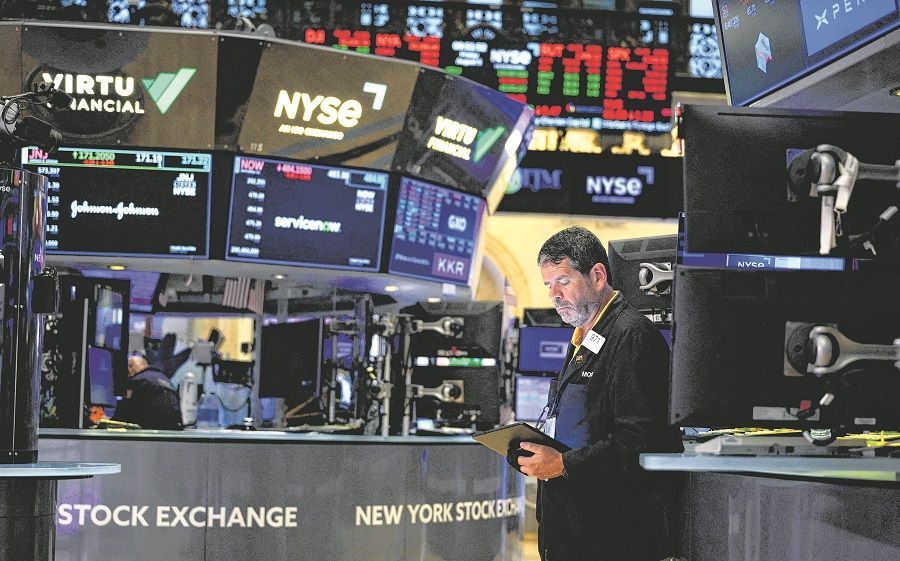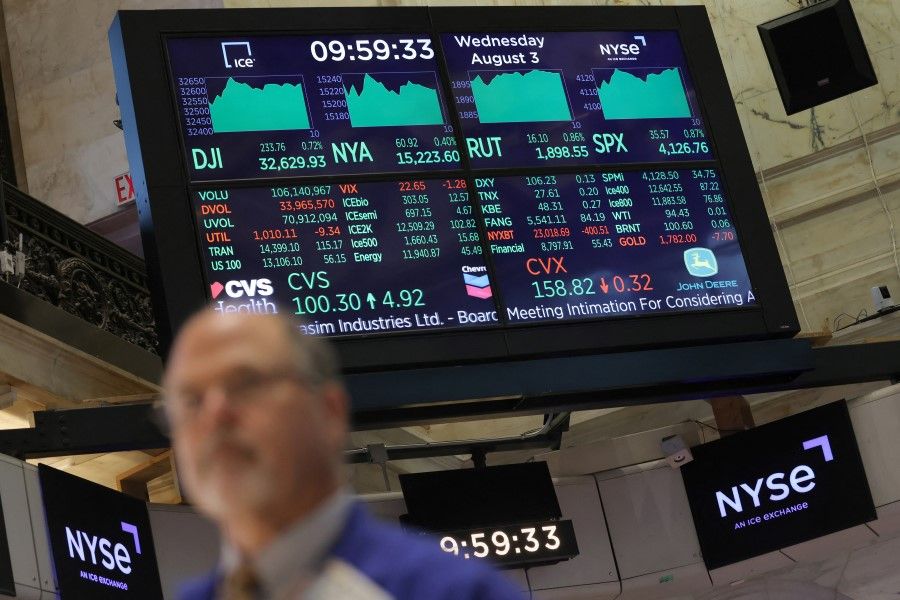Financial decoupling: China's next step amid intensifying China-US rivalry?

On 12 August, five Chinese state-owned enterprises (SOEs) - China Life Insurance, Aluminium Corporation of China, PetroChina, Sinopec, and Sinopec Shanghai Petrochemical Co., Ltd - announced plans to delist from the New York Stock Exchange (NYSE). Some analysts believe that this marks greater competition between Chinese and American capital markets. Along with the recent signing of the CHIPS and Science Act into law in the US, which ramps up restrictions on China's chip companies, China and the US seem set to decouple in more areas.
Small volume, huge cost
The China Securities and Regulatory Commission (CSRC) released a statement explaining that listing and delisting companies are part of capital market norms. It stated, "These companies have strictly complied with the rules and regulatory requirements of the US capital market since their listing in the US and made the delisting choice for their own business considerations."
The CSRC added that these companies are listed in multiple markets, and only a small portion of their securities are traded in the US markets. The delisting plan "will not jeopardise these companies' fund-raising ability through domestic and overseas markets".
The five SOEs cited similar reasons for delisting from the US. Firstly, they have a relatively small amount of American depositary shares (ADS). For example, as of 9 August 2022, PetroChina's ADS represented just 0.45% of its total share capital.
Simply put, it is reasonable for the five Chinese SOEs to give up their listing on the NYSE as their small amount of ADS is not worth the huge administrative expenses.

Secondly, they are also under considerable administrative burden to perform the necessary disclosure obligations. To maintain their listing on the NYSE, enterprises would have to incur a significant annual expense, including the fees payable to accounting firms, law firms, the stock exchange, and so on.
Simply put, it is reasonable for the five Chinese SOEs to give up their listing on the NYSE as their small amount of ADS is not worth the huge administrative expenses.
China's move to decouple from US
While these reasons make sense, the SOEs' decision to delist from the NYSE is also due to China's persistent reluctance to allow US securities regulators to inspect the financial audits of its US-listed companies.
In late 2020, the US passed the Holding Foreign Companies Accountable Act (HFCAA) which requires financial statements of public companies to be audited by a registered public accounting firm. If the Public Company Accounting Oversight Board cannot conduct inspections of audits for three consecutive years, the enterprise will be forced to delist.
Following the passing of the Act, China concept stocks have plummeted. Chinese regulators believe that major SOEs and some private enterprises listed in the US hold large amounts of data concerning national security and people's privacy. Thus, accepting inspections by the US would pose a national security risk.

The outside world has a different interpretation of the Chinese SOEs' planned delisting. Some believe that this would allow Chinese private enterprises to maintain their listing in the US. Chinese and US regulators have long been at loggerheads over the Chinese regulators' adamance against submitting the audit records of domestic enterprises to foreign entities. After the five SOEs have been delisted, the Chinese side may make some concessions on this issue and allow certain private enterprises to continue listing in the US.
Others believe that Chinese and US regulators are locked in a tussle with little time left for negotiations, which are said to conclude by the end of the year. By allowing its five SOEs to delist, China is making concessions to gain leverage in the negotiation by asserting a tough stance.
Other views have it that with the tensions building between China and the US over the Taiwan Strait recently, the pulling out of Chinese SOEs from the US stock market is China's move to decouple from the US's financial sector, leaving the US without this bargaining chip to use against China if a fight breaks out in the Taiwan Strait.
Clearly, the US is no longer willing to allow Chinese companies to raise funds in the US market, as it feels that this would boost China's companies and economic strength.

Other analyses say that the delisting has little to do with the Taiwan Strait situation. China's huge holding of US debt makes this an easier target for the US to leverage, but China has not sold off its US debt on a large scale. Furthermore, even if fighting breaks out in the Taiwan Strait, these US-listed companies pose little threat to China because their shares are purchased by Americans - if the US government confiscates them, they would be confiscating American wealth.
One thing is sure: the SOEs' exit from the US market is a result of the intensifying China-US rivalry, and a sign of economic and financial decoupling between China and the US.
Complete decoupling is unrealistic
In the past couple of years, the US has used the HFCAA to threaten the delisting of Chinese concept stocks, with 160 US-listed Chinese companies on its removal list so far. Clearly, the US is no longer willing to allow Chinese companies to raise funds in the US market, as it feels that this would boost China's companies and economic strength.
The US previously clamped down on Huawei and other Chinese technology companies, and recently signed the CHIPS and Science Act into law, to limit China's technological development. In terms of financial markets, the US will also minimise US capital funds flowing into China to avoid supporting its rise.
Chinese companies pulling out of the US market shows that even in the case of economic and financial decoupling between China and the US, China will not give in to US pressure. On the other hand, China is also reconsidering its investments from economic, financial and industry security perspectives, to reduce reliance on the US market and strengthen its domestic financial market, in order to face a conflict in the Taiwan Strait or a complete break in China-US relations, which could happen at any time.
After all, both sides are highly integrated in terms of trade relations, and their interests are also closely tied, so a complete decoupling is unrealistic.

Nonetheless, the Chinese SOEs pulling out of the US market does not mean total economic and financial decoupling between China and the US. The US is still an important export market for China, and the US cannot find substitutes for many imports from China. No matter how unwilling both sides are to continue relying on each other, a complete decoupling will be difficult. After all, both sides are highly integrated in terms of trade relations, and their interests are also closely tied, so a complete decoupling is unrealistic.
But after US House Speaker Nancy Pelosi's visit to Taiwan in early August, China cancelled dialogue between the Chinese and US militaries, and suspended bilateral cooperation on cross-border crime, drug trafficking and climate change. Currently, it looks like the areas of competition between China and the US are expanding, and bilateral relations will not stabilise in the short term. In this context, the exit of the five Chinese SOEs from the US might be just the beginning - there may be more Chinese companies pulling out of the US market in future.
